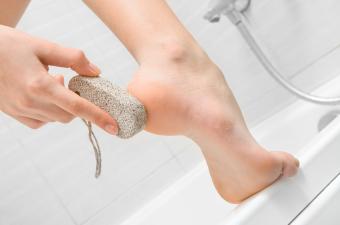
Your skin is the largest organ in your body and requires daily care to stay healthy. There are thousands of skin care products available, but many of are expensive or contain potentially harmful synthetic ingredients. Fortunately, it is possible to care for our skin in a holistic way, without having to rely on these types of products.
Holistic Care for Every Skin Type
Different skin types require different types of skin care. An ingredient that works on one skin type may cause problems for another.
Dry Skin
Dry skin is rough, flaky, itchy, cracked, chapped and may be appear ashen. Natural tips to treat or prevent dry skin include:
- Avoid hot water: Prolonged exposure to hot water can dehydrate the skin and strip it of oils.
- Cleanse gently: Harsh soap or cleansers can seriously irritate dry skin. Look for products that contain holistic ingredients that cleanse and soothe dry skin such as fresh cream, almond oil, olive oil, aloe vera gel, and/or vegetable glycerin.
- Moisturize daily: Excessively dry skin needs daily moisturizing. Natural oils that add healthy moisture to skin include jojoba, almond, olive and coconut. These can be applied directly to the skin - they also make a wonderful, non-irritating make-up remover.
- Take an oatmeal bath: Although very hot water is terrible for dry skin, adding a cup of colloidal oatmeal to a warm bath can soothe itchy, irritated skin. For even more relief, add 1/2 cup of honey or cream to running bathwater.
- To help prevent dry, cracked hands, wear gloves when cleaning.
Sensitive Skin
Inflammation is the hallmark of sensitive skin and causes acne, redness, burning and stinging, rosacea and allergic reaction. To soothe sensitive skin, try these holistic remedies:
- Tea tree oil: The anti-inflammatory properties of this natural ingredient helps treat acne and is less irritating than benzoyl peroxide.
- Rose water: Rose water is a wonderful, mild natural cleanser and moisturizer and a treat for the senses. You can use it directly on the skin or combine it with a carrier oil or witch hazel.
- Chamomile: Chamomile has been shown to reduce skin inflammation and is included in many holistic skin care remedies. You can wash your skin with chamomile tea or apply the tea bags to the inflamed areas of skin.
- French green (cosmetic) clay: This product is wonderful for treating acne and helping restore balance to skin. It's gentle yet deeply cleanses and clears pores. The clay can be combined with chamomile or green tea for even more skin healing benefits.
- Aloe vera: Aloe Vera gel is a natural skin powerhouse. It has antibacterial, antiseptic, antiviral and moisturizing properties that are well documented. Aloe vera gel can be applied directly to the skin to help heal acne and other skin irritations.
- Apply a honey mask: Honey has powerful antimicrobial powers and is chock full of vitamins and minerals. Honey, especially manuka honey, is proven to soothe inflamed skin caused by psoriasis, diaper dermatitis and dandruff (just to name a few). It also helps reduce and prevent wrinkles, moisturize skin and help prevent infection.
Oily Skin
Oily skin is caused by an overproduction of oils by the sebaceous glands. It leads to breakouts and a shiny appearance on the face. The following remedies can help:
- French green (cosmetic) clay: This clay isn't only beneficial to sensitive skin. It's a great option for oily skin. It absorbs excess oil and helps remove impurities.
- Gently exfoliate: Gentle exfoliation with an appropriate holistic scrub for oily skin helps remove excess oil and dead skin cells. However, you should avoid brisk exfoliation, which may stimulate oil glands, resulting in even oilier skin.
- Witch hazel: A natural astringent, witch hazel helps remove excess oil on the skin. To use, add witch hazel to a cotton ball and apply to face after cleansing. Witch hazel added to a spray bottle and stored in the refrigerator makes a great spritzer for hot summer months. Add a few peppermint leaves for extra refreshment. In addition to facial care, witch hazel soothes minor burns, insect bites and itching.
- The Complete Illustrated Book of Herbs by Reader's Digest suggests adding sea herbs to your diet to help reduce oily skin. These include kelp, kombu and arame.
Aging Skin
Aging skin is skin that is losing elasticity and moisture due to the passage of time. In addition to practicing holistic lifestyle habits, there are some natural remedies that can help slow skin's aging:
- Exfoliate regularly: This will help remove dead skin cells and help restore a healthy complexion. Exfoliation is not just for the face. Your arms, legs and feet will all benefit.
- Deeply moisturize the skin with jojoba, coconut, or almond oils.
- Massage your face: Add a few crops of coconut or lavender oil to your fingers and gently massage your face using upward motions to increase circulation.
- Use natural alpha-hydroxy acids (AHAs): AHAs can help diminish the signs of aging, though many over-the-counter alpha hydroxy products are extremely harsh and irritating. To lessen the risk of irritation, look for natural sources. Some fruits such as strawberries and apples are natural sources of AHAs and when combined with yogurt, make an age-fighting facial mask. To make the mask, simply combine 1/4 cup mashed fruit, two teaspoons whole fat yogurt and one to two teaspoons oatmeal; spread on face and leave on for fifteen minutes, and rinse thoroughly.
Healthy Lifestyle Choices
Your skin's health is affected by many things - diet, the environment, emotional health and the ingredients in the personal care products you use. Regardless of the type of skin you have, any holistic skin care plan must be a part of an overall healthy lifestyle. Holistic lifestyle tips to promote beautiful skin include:
- Exercise regularly: According to WebMD, regular exercise is key to healthy skin. Exercise increases blood flow which helps keep skin cells nourished and remove free radicals.
- Stop smoking: Smoking has a devastating effect on the skin, especially the face. Not only does the act of smoking itself cause wrinkles around the mouth, but according to the Mayo Clinic, nicotine narrows blood vessels located on the skin's outer layer. This narrowing impairs blood flow. In addition, tobacco smoke chemicals damage collagen and elastin, which support skin's elasticity.
- Limit alcohol consumption: Dr. Nicholas Perricone states that drinking alcohol creates inflammation that can lead to skin dullness, enlarged pores and sagging. He also mentions that excess alcohol consumption causes widened blood vessels, flushing and broken capillaries.
- Use sunscreen: According to the American Academy of Dermatology (AAD), sun exposure causes premature aging and skin cancer. To reduce your risk, the AAD recommends using sunscreen with a minimum SPF30. To stay in line with your holistic lifestyle goals, purchase natural sunscreens made without potentially harmful ingredients.
- Manage stress and anxiety: According to Healthline, stress and anxiety can lead to skin problems. For example, they can make rosacea or psoriasis worse, cause rashes or hives and may lead to dehydration. Learning to manage stress and anxiety can help keep your skin looking its best.
- Get adequate sleep: Regular lack of sleep wreaks havoc on skin. It causes puffy eyes, dark circles and may lead to premature aging.
Nutrition for Healthy Skin
What you eat also has an impact on the health and appearance of your skin. Beautiful, healthy skin just isn't possible if you eat a diet of highly processed, unhealthy foods. To keep your skin looking radiant and nourished, try the following:
- Drink enough water: Hydration is critical for keeping skin moisturized, supple and firm. University of Wisconsin Health suggests dehydration causes dry, tight, flaky skin that leads to increased wrinkles. To help keep skin well hydrated, drink at least eight glasses of water each day. If you don't like the taste of plain water, add lemon, lime or orange slices or sprigs of mint.
- Eat healthy fats: Essential fatty acids help keep skin moisturized, hydrated, and firm. For healthy skin, WebMD suggests adding the following fatty acids (in the form of Omega 3 and Omega 6 fatty acids) to your diet: oily fish, flax, safflower oil, walnuts, soy, eggs, poultry and grains.
- Drink green tea: Research shows the polyphenols in green tea are possibly anti-inflammatory and anti-carcinogenic. It's believed that these properties may help treat certain skin disorders.
Natural Beauty
Unless someone discovers the proverbial fountain of youth, people will continue to look for ways to look young. However, beauty isn't only skin deep. Healthy, beautiful skin relies on a well-nourished, well-rested, active body. Once those factors are met, your skin will have natural vibrancy. Then, when specific skin care issues arise due to environmental or other factors, instead of relying on expensive over-the-counter products that contain ingredients you can hardly read, try a holistic remedy instead.
Although the above remedies are considered gentle and safe, allergic reaction or irritation can occur with any natural ingredient. Please consult your doctor before using any holistic remedy to treat your skin.







